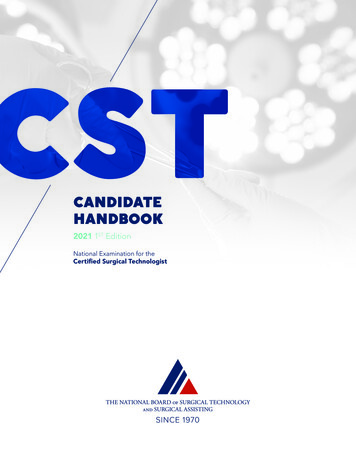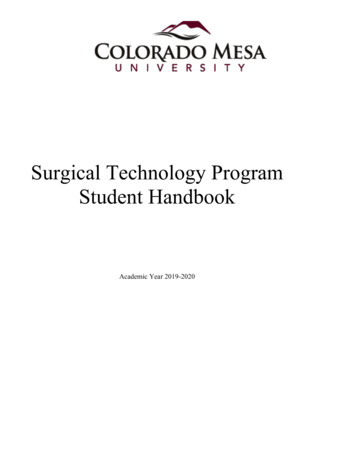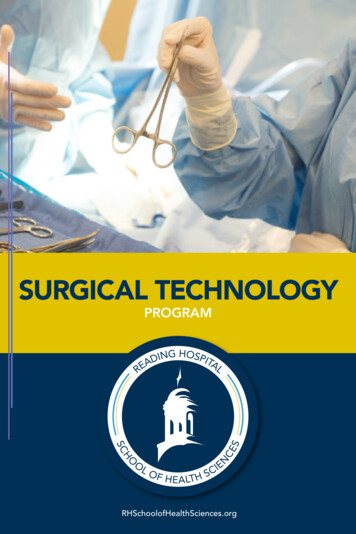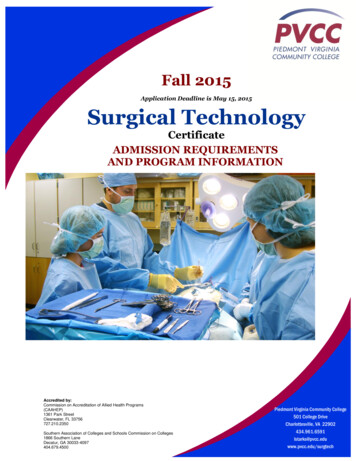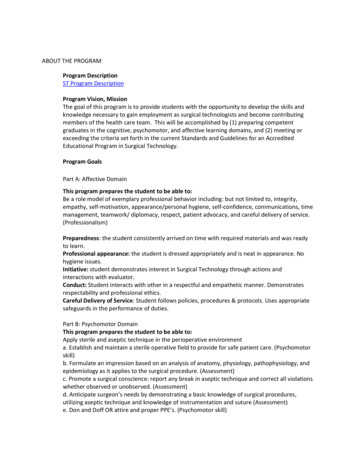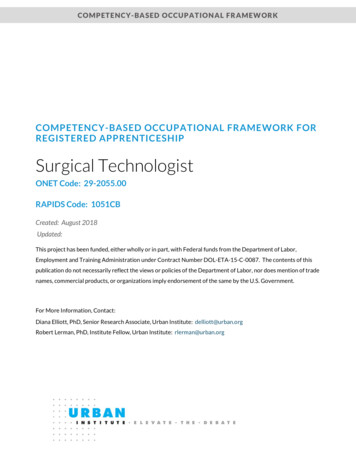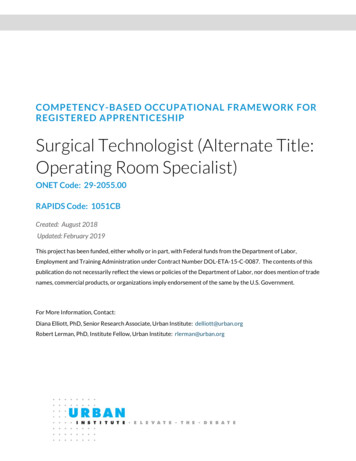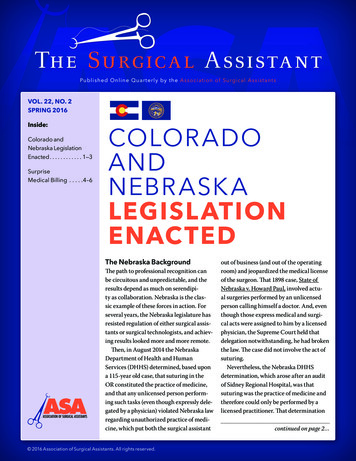
Transcription
The Surgical AssistantPu b l i sh e d O n l i n e Q uart erl y by the As s ociation of Su rg ica l As s is ta n tsVOL. 22, NO. 2SPRING 2016Inside:Colorado andNebraska LegislationEnacted . . . . . . . . . . . . 1—3SurpriseMedical Billing . . . . .4–6COLOR ADOANDNEBR ASK ALEGISL ATIONENAC TEDThe Nebraska BackgroundThe path to professional recognition canbe circuitous and unpredictable, and theresults depend as much on serendipity as collaboration. Nebraska is the classic example of these forces in action. Forseveral years, the Nebraska legislature hasresisted regulation of either surgical assistants or surgical technologists, and achieving results looked more and more remote.Then, in August 2014 the NebraskaDepartment of Health and HumanServices (DHHS) determined, based upona 115-year old case, that suturing in theOR constituted the practice of medicine,and that any unlicensed person performing such tasks (even though expressly delegated by a physician) violated Nebraska lawregarding unauthorized practice of medicine, which put both the surgical assistant 2016 Association of Surgical Assistants. All rights reserved.out of business (and out of the operatingroom) and jeopardized the medical licenseof the surgeon. That 1898 case, State ofNebraska v. Howard Paul, involved actual surgeries performed by an unlicensedperson calling himself a doctor. And, eventhough those express medical and surgical acts were assigned to him by a licensedphysician, the Supreme Court held thatdelegation notwithstanding, he had brokenthe law. The case did not involve the act ofsuturing.Nevertheless, the Nebraska DHHSdetermination, which arose after an auditof Sidney Regional Hospital, was thatsuturing was the practice of medicine andtherefore could only be performed by alicensed practitioner. That determinationcontinued on page 2
LB7212016LB7212016LB7212016LEGISLATURE OF NEBRASKALB7212016LB721LB7212016 Section 1. Sections 1 to 17 of this act shall be known and may be2016ONE HUNDRED FOURTH LEGISLATURE1LB721LB7212016SECOND SESSION1 asSec.8.Personalsupervisionby Act.a physician means the physical 72120161 2.andpersonalsupervisiona physicianappropriate2 Sec.attendanceof athephysicianthe room ofduringthe performanceof toa the 20163TheunderLegislaturefinds inthat:LB721LB721LEGISLATIVE BILL 721451201612016Sec.17. isTheboardshall, pursuantto professionsection 38-126:2 Surgicallevelofassistingcompetenceof anthe establishedsurgicalfirstassistant.3 (1)surgicalprocedure.healthinLB721LB7211 9.(15)TheHearingInstrumentSpecialistsPracticeAct;2 2016(1)Recommendto thedepartmentthe issuanceof licensestoFirstpractice theSurgicalassistingmeanspracticeof promotingpatientSec.34Nebraska;1 firstCredentialingAct:2 PracticeAct;3 eAct;4 SurgicalAssistantPracticeshall:5 stantsaid thein assistanceensuringa safesurgicalIntroduced by Baker, 30.6Read first time January 06, 201672(1) (2)(a)Acupuncture;TheMassagePractice4 a edon national5Be(17)certifiedassurgicalfirst Act;assistantby an standardsapproved fetybyusingappropriatetechniquesCommittee: Health and Human icalNutritionTherapyPracticeAct;5 4 edtocarry6 Sec.certifyingbody;Surgicalfirstassistantmeansa aspersonwhomeets outthe the act;for7 2)(c)AlcoholanddrugA BILL FOR AN ACT relating to the Uniform9 graphyPracticeAct; ctice t assistant8requirementssection12Medicalofthisact. ;7 amapprovedbytheboardorother projectexperientialor thetraining9 of ound;2section3(e)Athletictraining;38-121, Revised Statutes Cumulative 11Supplement,2014,7 6of section(21)TheMentalHealthPracticeAct;8 ing,including,butnotconductlimitedto, theand imposeand47(3)(f)Audiology;38-101, Revised Statutes 2)TheNursedisciplinaryactionsinPracticerelationto complaintsagainstlicensedsurgical10It 9Havea g:isthetopassedencouragethemost Act;effectiveutilizationof58to repeal(g)Speech-languagepathology;First Assistant Practice Act; to harmonizeprovisions;and9 istingundertheUniformCredentialingAct;and tasks11 ofexaminationadoptedbytheboard;and12 skills(1)thesurgicalteamin theintraoperativecare of rm6the original sections.7149(4) 0Performother Homedutiesasunder Act;thedeterminedSurgical byFirst12 byHavea Thehighschooldiplomaor requiredthe sician.10(i)Chiropractic;Be it enacted by the people of the State 12AssistantPracticeActand UniformCredentialingAct. Act13 3.theboard.14 esSupplement,2015,14 1313.TheSurgicalFirstAssistantPracticeAct shall notbe15 ntialingAct,unlessthe Act;14amendedtoread:15 requires,construedto:16(4)Providingvisualizationof tions4 to10 of this act181617apply.19 continued from page 01to 38-1,141andthefollowingpracticeoracts(1) niquesto sicalPracticeAct;16shall be(29)knownandmaybe Therapycited astheUniformCredentialingAct:17 Uniform18 sureof ation2015 AdvancedPracticeNursePracticeAct;18 t;practiceforwhich heor she acticeAct;TheAlcoholand interruptedDrugCounselingPracticeAct;19 alming;TheRespiratoryCarePractice19 18(3)TheAthleticTrainingPractice20 andProhibitanystudentenrolledin Act;a Act;bonafidesurgical first21absorbableor tioninan cticeAct;21 andassistanttrainingrecognizedbythe e ceAct;(34(5)TheCertifiedNursePracticeAct;22 5.21dutiesarenecessaryfor Midwiferythestudent'scourseof study,if andthe23 ellStandardsand eredNursePracticeAct; singskinwithmethodindicatedby onofHealthand26training;IfThethereisanyconflictany certifiedprovisionofsections38-101 to23 2221Sec.(7)Practice24 ProgramsA Chiropracticpersonlicensedas betweena ndstaples;and ceAct;25accreditationassistanthasright entityapprovedbytheboard.282423 tology,Electrology,Esthetics, Nail Technology, and26 directedassistantand(u)theMassageabbreviation27 ineand ,26BodyPracticeAct;Sec. Art15.27 7.The firstdepartmentshallestablishandcollectfees for28 dsurgicalassistantmeansa s Surgicalenumeratedin Firstsubdivisionsthrough (33)(10)TheMedicalDentistryPracticeAct;Surgical28 27initiallicensureand o29 hin38. .Actas nmentalHealthSpecialistsPracticeAct; byA mSec.(12)16.(10)othertasksduringa surgicaldelegated31-2(z)Nailtechnology;2928 2014,isamendedtounderread:the personal30(13)TheFuneralDirectingand of Act;a physician.was enlarged to a statewide ban, and surgical assistants,even though certified, were denied the right to practice inNebraska. All hospitals and surgery centers in the state prohibited any unlicensed surgical assistant from suturing,which necessarily meant that they were not able to assist inthe OR. Surgeons who employed, or relied upon, unlicensedsurgical assistants in their practice were unable and unwilling to continue surgical procedures at various hospitals. Andthe hospitals would have to furnish licensed individuals,such as PAs and RNFAs to perform the functions customarily performed by these skilled surgical assistants.This untenable situation prompted the Nebraska HospitalAssociation (which, like its counterparts in other states,routinely oppose licensure) to begin and support an initiative to license surgical assistants in Nebraska. Professionalregulation in Nebraska begins with a pre-legislative provescalled a “407 proceeding.” Sidney Regional Hospital, as theapplicant, began the journey to convince the appointed 407Committee, the Department of Health, and finally the legislature, to license surgical assistants.The Surgical Assistantwith25The initial application needed guidance, and NE-AST,-3(aa)Nursing;38-121(1) No theirindividualshall engagein the colleagues,following practices(14)The ssistantredraft-4home administration;3130 unless (bb)suchNursingindividualhas obtained a credential under the Uniformed andrefined the document,proposed the appropriate-531(cc) Occupational therapy;-6technical and definitional language, met with stakehold-7ers and interested parties, attended and testified at the 407Committee hearings, appeared before the Department ofHealth, assisted in drafting the bill to be considered by thelegislature, and lobbied the bill until its successful passage.At one juncture in the proceedings, NE-AST testified as aneutral (not in support) to allow reconsideration and amendment of the bill language to include OJT considerationfor CSFA certification to support licensure. WIthout theamended language, 90% of all surgical assistants in the statewould have been forced from practice. The law as passednow allows on-the-job experience, not just program attendance and graduation, to support a path to licensure. The billpassed in the 2016 legislative session.Nebraska surgical technologists are advancing their ownregistration legislation in 2017, with the support of SenatorKolterman, and they know they can count on reciprocalsupport from their surgical assistant colleagues. Together.stronger.31 30292is
Second Regular SessionSeventieth General AssemblySTATE OF COLORADOLLS NO. 16-0429.01 Kristen Forrestal x4217HOUSE SPONSORSHIPGinal and Lontine, Esgar, Primavera, RydenINTRODUCEDHOUSE BILL 16-11601Be it enacted by the General Assembly of the State of Colorado:SENATE SPONSORSHIPNeville T.,2132 follows:official declaration of the vote thereon by the governor.as412-43.2-107. Repeal of article. This article is repealed, effective5September 1, 2016 2021. Prior to such repeal, the registration of surgical6assistants and surgical technologists shall be reviewed as provprovided in7section 24-34-104, C.R.S.89Senate CommitteesA BILL FOR AN ACT101102SECTION 2. In Colorado Revised Statutes, 24-34-104, repeal(47.5) (b); and add (52.5) (f) as follows:1024-34-104. General assembly review of regulatory agencies11reestablishmentand functions for termination, continuation, or reestablishment.12termi(47.5) The following agencies, functions, or both, shall terminateon13September 1, 2016:House CommitteesHealth, Insurance, & EnvironmentNovemberin suchcase,Statutes,will takeamendeffect 12-43.2-107on the date of theColoradoRevisedSECTION20161. In and,14(b) ANDThe registration of surgical assistants and surgicalASSISTANTCONCERNING THE CONTINUATION OF THE SURGICALSURGICAL TECHNOLOGIST REGISTRATION.15PROGRAMtechnologistsBill Summary16pursuant to article 43.2 of title 12, C.R.S.;o(52.5) The following agencies, functions, or both, terminate on17September 1, 2021:(Note: This summary applies to this bill as introduced and does18 adopted. If(f)HE REGISTRATION OF SURGICAL ASSISTANTS AND SURGICALnot reflect any amendments that may be subsequentlythisTbillpasses third reading in the house of introduction, a bill summary thatTECHNOLOGISTS PURSUANT TO ARTICLE 43.2 OF TITLE 12, C.R.S.applies to the reengrossed version of this bill19will beavailable ION 3. Act subject to petition - effective date. This act21 andtakeseffect at 12:01 a.m. on the day following the expiration of theSunset Process - House Health, Insurance,EnvironmentCommittee. The bill continues the requirement that surgical techniciansassemb (August22 of theninety-dayand surgical assistants register with the directordivisionperiodof after final adjournment of the general assemblyprofessions and occupations in the department of23regulatoryagencies.ent sine die is on May 11, 2016); except that,t10, 2016,if adjournmentif a24artic V of thereferendum petition is filed pursuant to section 1 (3) of article25par of this actstate constitution against this act or an item, section, or partShading denotes HOUSE amendment.t. Double underlining denotes SENATESEamendment.Capital letters indicate new material to be added to 26existing statute.n take effectwithin such period, then the act, item, section, or part will notDashes through the words indicate deletions from existing statute.The Colorado Background27hel inunless approved by the people at the general election to be heldAgain, serendipity was a factor in the passage of legislationin Colorado. The Department of Regulatory Agency (DORA)registration legislation for surgical assistants and surgicaltechnologists was due to sunset in 2016. DORA posited thatthis registration was no longer needed.ASA efforts began in 2015 to renew the legislation thatwas enacted in response to the surgical technologist, KristenParker, who stole fentanyl and eventually passed Hepatitis Cto 18 unsuspecting surgery patients at Rose Medical Centerin 2009. A total of 4,700 surgical patients were screened forpossible exposure. (Editor’s note: Kristen Parker was not certified or a member of AST).Memories fade. Last year, the Colorado legislative atmosphere was decidedly anti-regulatory and hopes to renewthis legislation dimmed.Then, Rocky Allen became headline news. He was another surgical technologist (uncertified) who abused fentanyl while employed at Swedish Medical Center beginning in2015. The hospital advised 2,900 patients to be screened forhepatitis B and C as well as HIV.Allen’s trouble reportedly started while serving in themilitaryin Afghanistan. Hewas then fired from two hospi-2HB16-1160tals in Washington,one in California,-3HB16-1160 and another two inArizona— one in which he was found passed out in the bathroom holding a syringe.There was an apparent history of substance abuse but thecan was kicked down the proverbial road until Colorado.Rocky Allen was registered in Colorado but denied everbeing previously fired. At the time, the Colorado registrationdid not require a background check or drug testing.Despite this incredible violation of patient safety, DORAmaintained that the registration was unnecessary. And thenalong came the media—an unrelenting media.The legislative atmosphere changed. New legislation forregistration now requires a criminal background checkand mandatory drug testing. The new bill was enacted andsigned by the governor in June.These two experiences certainly indicate that no matter how valuable or worthwhile legislative causes are basedon—sometimes the final determining factor is out of ourhands. That being said, what happened in both Nebraska andColorado was good.The Surgical Assistant3
SURPRISEMEDICALBILLINGAccording to a recent Consumer Reports survey, nearlyone third of privately insured Americans received a surprisemedical bill when their health plan paid less than expected. Approximately 25 percent of the survey respondentsreceived a doctor’s bill that was not anticipated.This gap in expectations can be attributed to the reimbursement levels set by insurance companies and the bills ofout-of-network medical practitioners. These out-of-networkmedical practitioners include ER physicians, anesthesiologists, radiologists—and surgical assistants. All of these practitioners may be providing services at a patient’s insurer’s innetwork hospital systems.Some situations may result from an emergency when thepatient has had no opportunity to decide on the medicalprovider(s); or when the patient receives care at his/her innetwork hospital; or a healthcare facility and other providers,not in the same network, participate in the treatment. Thereare even some circumstances where an entire in-networkhospital department has contracted for the services of providers who don’t participate in the network.in-network services and a certain percentage of allowedout-of-network charges.)2. Balance Billing. Hospitals negotiate a fee schedule forservices with in-network providers that typically reflect adiscount from the providers’ full charges. Network contracts customarily prohibit their in-network providersfrom billing the difference between the allowed chargeand the full charge. However, the out-of-network providers are under no legal obligation and can bill patients forthe differences.The surprise medical bill essentiallyincludes two parts:In the past two years, 30% of privately insured Americansreceived a surprise medical bill (a medical bill where thehealth plan paid less than expected). This number is lower(23%) among the California subset. When looking at just thehospital subgroup (individuals who had emergency room1. The difference in patient costs between in-network andout-of-network providers (under some insurance plans,patients are responsible for a defined percentage of4The Surgical AssistantSURVEYS DRAWING ATTENTIONTO SURPRISE BILLINGSeveral national surveys have been publishedregarding the issues related to surprise billing.1. Consumers T-PUBLIC.pdf
visits/hospitalizations/surgery in the past two years), thenumber rises to 37%In the past two years, one in seven patients have been surprised to find out that a doctor/lab/facility they thoughtwas In-network, was actually Out-of-network. Many (63%)assumed that doctors working at an in-network hospital arealso in-network. Accordingly, the majority (85%) think hospitals should have to notify patients if a doctor/technicianinvolved in a procedure performed at that hospital will beout-of-network.2. New York Department of Financial pectedMedical Bills-march 7 2012.pdfMore than 2,000 complaints were filed related to surprisemedical bills. The average out-of-network emergency bill was 7,006. Insurers paid an average of 3,228; consumers paidan average of 3,778.In the same study, results showed that 90 percent of surprisemedical bills were not attributed to emergency services butfor other in-hospital care, such as anesthesiology, lab services, surgery and radiology. Out-of-network assistant surgeons,often called in without a patient’s knowledge, on average billed 13,914, while insurers reimbursed 1,794.New York implemented a mandatory, dispute resolutionsystem, requiring insurers and providers to resolve out-ofnetwork payment disputes, while holding patients harmless.3. Texas Department of Insurancehttp://forabettertexas.org/images/HC 2014 09 PPBalanceBilling.pdfInsurers determine their own “usual and customary charge”calculations within state standards, and consumers can stillbe balance billed for provider charges that exceed an insurer’s calculation. Varying insurer calculations likely mean someconsumers are better protected from balance bills than others.In addition, a recent consumer complaint reviewed by CPPPcalls into question whether an insurer is adhering to new stateprotections, indicating more oversight may be needed.4. West Virginia Committee on Health and HumanResources Reporthttp://www.legis.state.wv.us/Bill Text -network care in 2011, and 40 percent of these casesinvolved surprise out-of-network claims. A study of surprisemedical billings was authorized and results, together withrecommendations and legislative remedies, are scheduled tobe reported in 2017.5. Florida Surprise Medical Billing om/bills/2016/pdf/0221ER.pdfNearly, everyone agrees that patients who unwittinglyreceived services from out-of-network providers at in-network facilities should be protected from these bills. Thepolitical holdup is determining how much to pay the out-ofnetwork providers. Florida sidestepped the payment issueby leaving that up to a yet-to-be-developed dispute resolution process.6. California Surprise Medical Billing s/billTextClient.xhtml?bill id 201520160AB533A California bill has been introduced that would eliminateunexpectedly high medical bills, the kind that hit patientswho have received care at a medical facility outside of theirinsurance network without knowing about it. The measurewould limit the amount a patient can be charged by an outof-network provider to no more than what he/she would havepaid if that provider had been in-network.7. Missouri Advocacy Health prisebillingCurrently, the Missouri Advocacy Health Alliance is seeking feedback regarding surprise billing and compiling data topresent for possible legislative initiatives.8. Washington Surprise Billing aspx?bill 2447&year 2015House Bill 2447 would ensure that patients pay only expected charges — including copays and deductibles — for emergency care. If there’s a dispute about contracts or out-of-network fees, the problems would have to be worked out withthe insurer and the provider or hospital.This report referenced a national study which showedthat 8 percent of privately insured individuals utilizedThe Surgical Assistant5
9. Colorado Surprise Billing LegislationHealthcare providers are required to hold harmless from balance billing patients who make a good faith effort to obtaincare from an in-network provider. The National Associationof Insurance Commissioners (NAIC) has issued a ModelNetwork Adequacy Act which addresses balance billing(Section 7); and the Colorado Department of Insurance isstudying implementing provisions of the Model Act intoColorado law. (ASA members, read the Model Act that is published on the Members Only page under Legislative).10. National Academy for State Health /04/BCBS-Brief.pdfStates are initiating action to explore the consequences ofsurprise billing. This report provides an update on state legislative activity to address surprise balance billing.11. US House of Representatives End SurpriseBilling use-bill/3770/textThis proposed legislation is intended to amend the SocialSecurity Act to prevent surprise billing practices on a national scale. While surgical assistants cannot bill Medicare, thislegislation could potentially have substantive consequences.ConclusionSurprise medical billing is an issue that has become part ofthe national healthcare discussion. Surgical assistants whoprovide out-of-network services are advised to understandwhat initiatives may be active or proposed in their states.This is certainly a challenging topic but individuals acrossmany states are urging action—it cannot be ignored.?AME XPAAFSCEHTROE.FAGCKGTES TIN ST SMART WITH THE ASA EX AM PREPTEBE PR EPAR ED AN Deasy. Of course, youThe CSFA exam is notstudy from a variet yneed to study, study,ides, references, andof resources. Study guonline opportunities.t always knowing thePassing an exam is nosometimes youright answer— becausern skills to identify thedon’t. But you can leaincorrec t responses.ckage takes youThe ASA Exam Prep Pa,ses in A&P, physiologyback to critic al exercidanpharmacologymedic al terminology,u know? What canyophysiology. What doyou surmise?ckage reinforcesThe ASA Exam Prep Paow—and helps youwhat you think you kned to reinforce.pinpoint areas you neckage includes threeThe ASA Exam Prep Panc tion with pre - andonline videos in conjuses. This packagepost- evaluation exercig an ASA Exam Prepwas recorded live durinials were developedWorkshop and materh practitioners.by leading allied healtle only toThe package is availabmakes senseASA members. It onlyills for thisto boost your study skimportant exam.5 atOrder it online for 3ant.org.w w w.surgicalassist
EARN UP TO 13 CONTINUINGEDUCATION CREDITS AT THE2016 ORLANDO MEETINGSEPTEMBER 30-OCTOBER 1, 2016HOLIDAY INN ORLANDO—LAKE BUENA VISTAAll CSTs, CSFAs, CSAs and SA-Cs are invited.ASA MEETING AGENDAFRIDAY, SEPTEMBER 30SATURDAY, OCTOBER 1 8 CEs11 am–5 pm Registration7:45–8 am Welcome Kathy Duffy, CSFA, CSA9 am–1 pm ACL Graft Workshop 4 CEs8–8:50 am Pedispine Mark Moran, MDChris White, CSFASee agenda online on ASA website.9–9:50 am Assisting in RoboticsGeorge Stransky, MD2–4 pmBone Splinting 2 CEs- Various splints for upper and lower extremities- The concepts of Splinting in the OR- Supplies needed for splinting- Landmarks, techniques and procedure- Hands on Splinting—2 Upper and 2 Lowerextremities10–10:50 am Health ProfessionsDennis Stover, CSA11–11:50 am Billing Q&ADavid Bartczak, CSA, LSA, OPA-CNoon–12:50 pmLunch (sponsored by NBSTSA)David Bartczak, CSA, LSA, OPA-C1–1:30 pmNoon–4 PM CSFA Exam Prep Workshop1:40–2:30 pm Paraesophageal HerniaGeorge Tuchsen, MD5–6 pmBusiness Session 1Business Session 22:40–3:30 pm TAVR Michael Morrison, CSFA6–7 pm Keynote Address:Creating Value in Healthcare 1 CEWilliam Cooper, MD, MBA, FACS3:40–4:30 pm Hospital vs Independent AssistantJoseph Lundberg, CSFA7:15–8:30 PM Reception4:40–5:30 pm ClosingSam Araba, MDAttendance is limited to 125. Confirmation will be emailed. Onsite registration will be available on a space-available basis.All cancellations must be received in writing by September 12, 2016. Accommodations: Holiday Inn Orlando Downtown LakeBuena Vista, Florida; 1805 Hotel Plaza Blvd, Lake Buena Vista, Florida 32830, 877-394-5765. Rates: 105/night plus tax,single or double. occupancy. Reservation deadline is August 23, 2016. Room block is limited.ASA ORLANDOMEETING FEES(Includes Friday receptionand keynote, Saturday Edsessions and lunch).Association of SurgicalAssistants6 West Dry Creek CircleSuite 200Littleton, CO 80120303-694-9130www.surgicalassistant.orgASA ORLANDO MEETINGASA member: 275ASA student member: 175(currently enrolled inCAAHEP-accreditedsurgical assisting program)Nonmember: 300HANDS-ON WORKSHOPSACL Graft:ASA member 250 /nonmember: 275Bone Splinting:ASA member 125 /nonmember: 150Exam Prep:ASA member 50 /nonmember: 75Register and pay online atwww.surgicalassistant.org
LEGISLATIVE ADVOCACYAND RECOGNITION Enacted VirginiaRegistration SurgicalAssistant Law 2013 Enacted Nebraska SurgicalAssistant Licensure Law 2016 Supported IllinoisRegistration Law 2015 Engaging in Texas SunsetLegislative to Sunrise2015–2016 Initiating Tennessee SurgicalAssistant Legislation 2015 Enacted
2 level of competence of the surgical first assistant. 3 Sec. 12. An applicant for licensure under the Surgical First 4 Assistant Practice Act shall: 5 (1) Be certified as a surgical first assistant by an approved 6 certifying body; 7 (2) Have successfully completed an approved surgical first assistant


